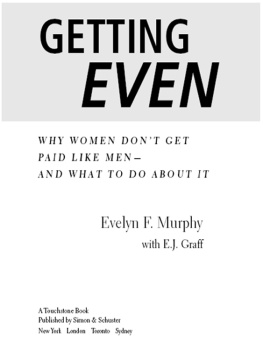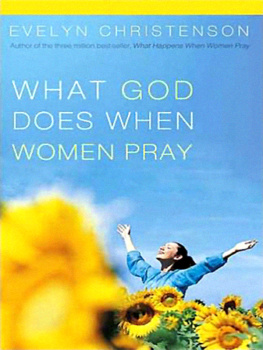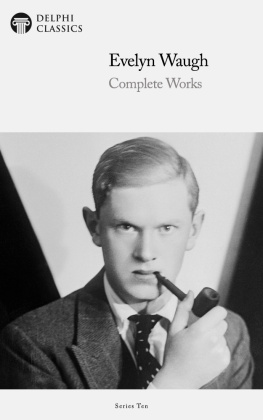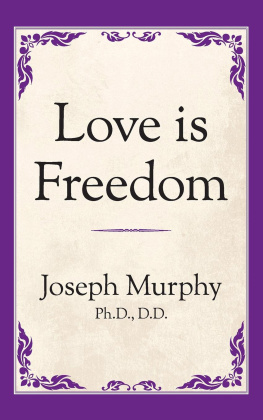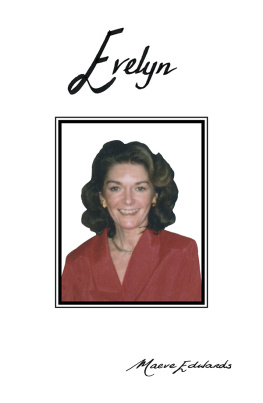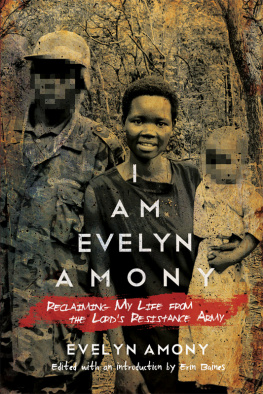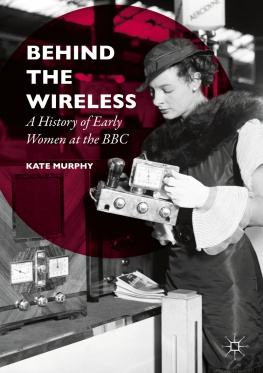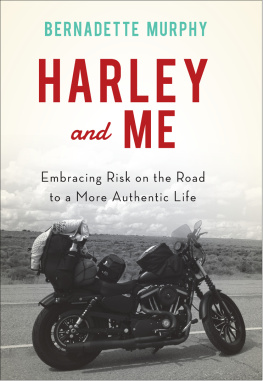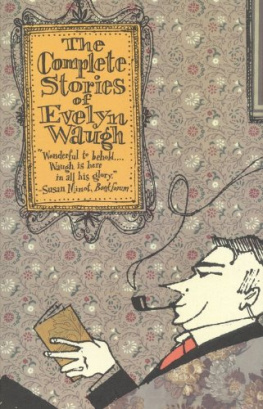Evelyn Murphy - Getting Even: Why Women Dont Get Paid Like Men--And What to Do About It
Here you can read online Evelyn Murphy - Getting Even: Why Women Dont Get Paid Like Men--And What to Do About It full text of the book (entire story) in english for free. Download pdf and epub, get meaning, cover and reviews about this ebook. year: 2006, publisher: Touchstone, genre: Detective and thriller. Description of the work, (preface) as well as reviews are available. Best literature library LitArk.com created for fans of good reading and offers a wide selection of genres:
Romance novel
Science fiction
Adventure
Detective
Science
History
Home and family
Prose
Art
Politics
Computer
Non-fiction
Religion
Business
Children
Humor
Choose a favorite category and find really read worthwhile books. Enjoy immersion in the world of imagination, feel the emotions of the characters or learn something new for yourself, make an fascinating discovery.
- Book:Getting Even: Why Women Dont Get Paid Like Men--And What to Do About It
- Author:
- Publisher:Touchstone
- Genre:
- Year:2006
- Rating:4 / 5
- Favourites:Add to favourites
- Your mark:
- 80
- 1
- 2
- 3
- 4
- 5
Getting Even: Why Women Dont Get Paid Like Men--And What to Do About It: summary, description and annotation
We offer to read an annotation, description, summary or preface (depends on what the author of the book "Getting Even: Why Women Dont Get Paid Like Men--And What to Do About It" wrote himself). If you haven't found the necessary information about the book — write in the comments, we will try to find it.
Evelyn Murphy: author's other books
Who wrote Getting Even: Why Women Dont Get Paid Like Men--And What to Do About It? Find out the surname, the name of the author of the book and a list of all author's works by series.
Getting Even: Why Women Dont Get Paid Like Men--And What to Do About It — read online for free the complete book (whole text) full work
Below is the text of the book, divided by pages. System saving the place of the last page read, allows you to conveniently read the book "Getting Even: Why Women Dont Get Paid Like Men--And What to Do About It" online for free, without having to search again every time where you left off. Put a bookmark, and you can go to the page where you finished reading at any time.
Font size:
Interval:
Bookmark:
This is a book that I had to write. Not one that I wanted to write but had to. Its contents have riled my sensibilities every single day of the seven years that I have been researching and writing it. Along the way, I have been remarkably fortunate that many wise and wonderful people have enthusiastically offered their time and energy to enrich this work. I want to thank them for their generosity.
I am extremely grateful to scholars, activists, and businesspeople who read and critiqued the entire manuscript, page by page, letting nothing slip by their intense scrutiny. In so doing, Michael Ames, William Bielby, Linda Glenn, Jennifer Jackman, Stacey Lauren, Martha Minow, June Rokoff, Eleanor Smeal, and Joan Williams improved this work immeasurably. Randy Albelda, Nina Balsam, Emily Barkin, Christina Crowe, Dawn-Marie Driscoll, Eileen Friars, Shanti Fry, Carol Goldberg, Heidi Hartmann, Victoria Lovell, Jane McBride, Tom and Nancy Rogers, and Ronnie Steinberg reviewed parts of the manuscript and waded through early versions laden with mind-numbing facts and numbers. Each of them made valuable contributions to this work. To all, my profound thanks.
I am indebted to friends and colleagues who gave me forums in which to present my research and recruit interviewees, as well as to those who just listened to me work through the material in my head for years: Shula Reinharz and the scholars in the Womens Studies Research Center at Brandeis University; Mary Lassen and the Womens Educational and Industrial Union; as well as Meg Bond, Ann Caldwell, Betty Diener, Sherri DuFloq, Mary Jane England, Mary Fifield, Betsy Fitter, Ellen Friedman, Jennifer Hicks, Sheryl Marshall, Alana Murphy, Carol Nadelson, Janis Pryor, Virginia Pfifer, and Marie Sheehan. Brandeis students Carol Lue and Tammy Pels, along with Northeastern Law School students Alyson Robbins and Jessica Copeland, spent endless hours researching discrimination cases and federal statistics. Joan Bok, Clare Dalton, Harold Meyerson, Shelby Scott, and Faith Zwemke provided important data or resources. Ellen Goodman, Hamilton Jordan, and John Laub gave me timely and sage advice about the process of publishing.
EEOC lawyers, plaintiffs bar attorneys, expert witnesses, court monitors, and others involved in discrimination cases provided valuable materials and insights about discrimination cases. I am particularly indebted to Marc Bendick, William Bielby, Stephanie Bornstein, Noelle Brennan, Barry Goldstein, Donna Harper, Nancy Kreiter, Peter Laura, Adele Rapport, Larry Schaeffer, Gary Shultz, and Debra Smith.
Arlene Ash, Tracey Hurd, Sandy Jones, Elizabeth Marks, Marsha Mirkin, Phyllis Mutschler, Cheri Ostroff, Eleanor Shore, Janet Swim, Rhoda Unger, Robin Vann-Ricca, Nancy Wecker, and Lisa Wuennenberg generously gave their time to help me understand how their professional disciplines bear on wage discrimination.
I want especially to acknowledge the amazing women who volunteered to be interviewed. Some even gave permission to use their names. I offer my personal gratitude and hope everyone who reads this book appreciates their courage. Their voices add credibility and speak for many others who related their experiences but felt that if I used their names they might jeopardize their current jobs or future careers. I understand well that the latter must earn a living and respect their need for anonymity.
To Vikki Pryor I owe a special debt. For years, Vikki urged me and encouraged me not to speak through numbers and data but rather to interpret and draw conclusions from what I found in the facts. She helped me find my voice for this work.
When I first met Jill Kneerim, she said to me, I want to be your agent because I believe in this book. She is a treasurea trusted friend as well as literary agent. Without her guidance, advice, and help, this book simply would not exist. My heartfelt thanks to her hardly seem adequate.
E.J. Graff is a brilliant journalist who told me, Ill write this book the way you speak, rather than the way you write. She did that and much, much more. In the spirited collaboration we developed during the last two years, E.J.s ideas and insights became interwoven with mine throughout the book. I will be forever grateful for her singular contribution to this work. Her amazing research assistant Kelly Kinneen pitched in wonderfully at the last minute. Her writing group of Suzanne Berne, Madeline Drexler, and Laura Zimmerman contributed hours of editing and feedback, for which there can never be thanks enough.
Doris Cooper, a first-class editor, deserves enormous gratitude for her skill in stretching my thinking. She inspired me to explain more about the research I had gathered, in ways that greatly enhanced the final product. Peter Karanjias superb legal advice sharpened the books accuracy and punch. Of all the sympathetic men who want to help women get even, I am indebted most to publisher Mark Gompertz for his support and keen desire to see this book find its audience.
To those whose contributions I have not acknowledged through sheer oversight or failure of memory, please accept my apologies along with my gratitude.
While this book springs from a vast, ardent collaboration, I alone am responsible for any errors that slipped through the fact checking, for any misinterpretations of the advice given by those who reviewed various chapters, and for all the conclusions. Most of those who read the manuscript or early versions did not see my final conclusions. While all were sympathetic to my arguments, I make no claim that they agree entirely with the contents of this book.
Finally, my deepest appreciation goes to Jacque Friedman, to whom this book is dedicated, for her wholehearted support and belief in this work every step along the way. More than anyone, she has always encouraged me to pursue my dreams.
Evelyn Murphy
Brookline, Massachusetts
December 2004
E VELYN M URPHY was the Lieutenant Governor of Massachusetts from 1987 to 1991. She was the first woman in the states history to hold statewide office. She has been an executive vice president of Blue Cross & Blue Shield of Massachusetts and is a corporate director of SBLI USA Mutual Life Insurance Company, Inc. She is the founder and president of The WAGE (Women Are Getting Even) Project Inc., which is dedicated to closing the wage gap in every American workplace. Visit her at wageproject.org.
E.J. G RAFF , a senior correspondent for The American Prospect, has written for such publications as The New York Times, The New Republic, The Boston Globe, the Los Angeles Times, and Salon.com. She is the author of What Is Marriage For? The Strange Social History of Our Most Intimate Institution.
A re you paid as much as a man would be if he had your job?
Most working women today, if theyre over thirty, would probably blurt out, No. A man would be getting more.
Their intuitive sense is borne out by the facts. Women working full-timenot part-time, not on maternity leave, not as consultantsstill earn only 77 cents for every full-time male dollar. Very few individual women can ever find out exactly what their male counterparts would be making in the same job. But that yawning gap between the average male and average female paycheck is a pretty good clue that hed be paid more.
If youre a woman, what would you do with that extra 23 cents an increase of nearly one third on top of your current 77-cent paycheck a raise that got you even with men?
The wage gap has been stalled for more than a decade. It exists between women and men working at every economic level, from waitresses to corporate lawyers, from nurses aides to CEOs. Getting Even tackles the questions: Why are womens paychecks still so far behind? And what do we have to do to catch up?
Font size:
Interval:
Bookmark:
Similar books «Getting Even: Why Women Dont Get Paid Like Men--And What to Do About It»
Look at similar books to Getting Even: Why Women Dont Get Paid Like Men--And What to Do About It. We have selected literature similar in name and meaning in the hope of providing readers with more options to find new, interesting, not yet read works.
Discussion, reviews of the book Getting Even: Why Women Dont Get Paid Like Men--And What to Do About It and just readers' own opinions. Leave your comments, write what you think about the work, its meaning or the main characters. Specify what exactly you liked and what you didn't like, and why you think so.

